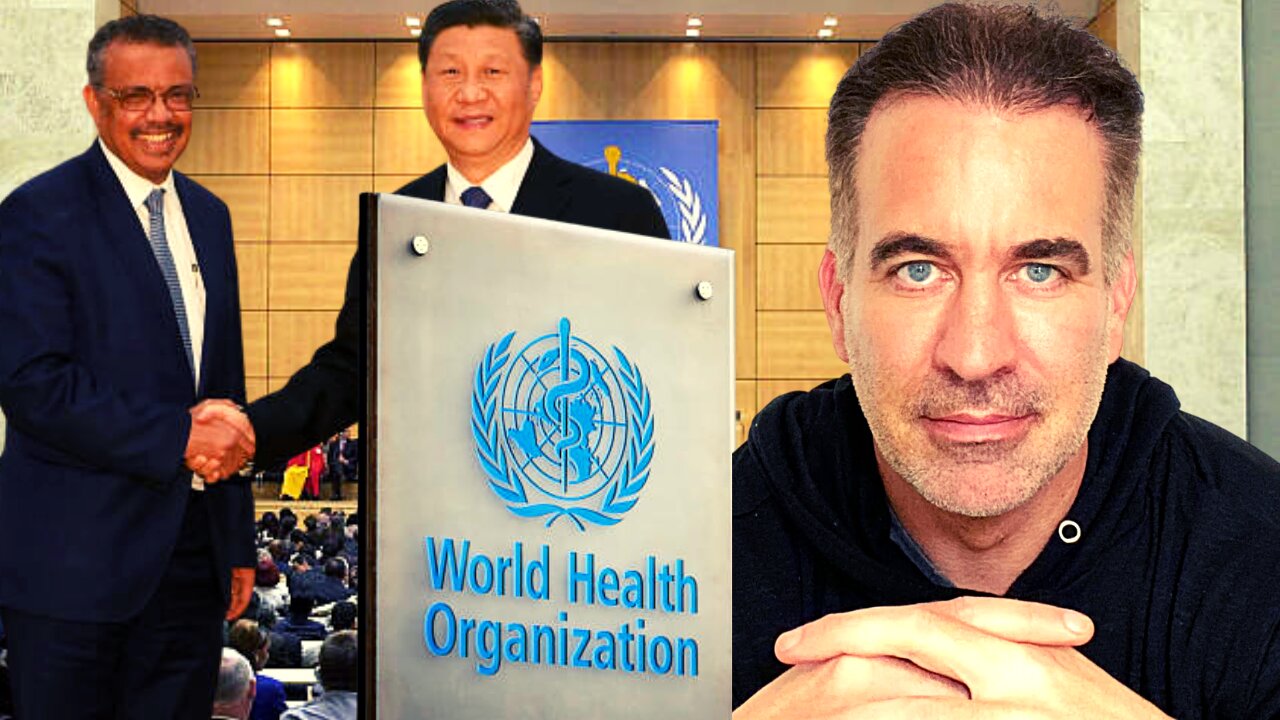Premium Only Content

The Biggest Story Of Our Time
THESE unelected officials have no business deciding United States Policy PERIOD! HEALTHCARE IS A STATE ISSUE
A clause in the treaty that says: moment signed-it takes effect! Binding the moment it is signed! EVEN IF SENATE DOES NOT TAKE IT UP ON THE FLOOR!
THIS IS THE MOST IMPORTANT TREATY FOR THE UNITED STATES OF AMERICA
IF SIGNED OUR SOVEREIGNTY WITH BE HANDED OVER TO UN (WHO)
LET ME BE CLEAR MEDICAL EMERGENCIES ARE JUST THE START-IT GIVES THEM BROAD POWERS TO TAKE AWAY YOUR RIGHTS
END GOAL: CHINESE SOCIAL CREDIT SYSTEM IN THE UNITED STATES:
World Health Organization zero draft pandemic treaty pushes for increased surveillance powers
The global, UNELECTED health agency is inching closer to being granted new, legally binding powers. If you're tired of censorship, cancel culture, and the erosion of privacy and civil liberties The World Health Organization (WHO) has released the latest zero draft of its international pandemic treaty which will give the unelected global health agency new sweeping surveillance powers if passed.
The treaty requires the WHO’s 194 member states (which represent 98% of all the countries in the world) to strengthen the WHO’s “One Health surveillance systems.”
Typically, elected officials vote on the laws that apply to their country, but with this WHO lawmaking process, a handful of global representatives decide the rules that apply to all countries. Regardless of whether a third of WHO member states vote against the international pandemic treaty, it will still apply to their countries under international law. In addition to limiting politicians’ power to decide on the laws that apply to their country, this process also limits citizens’ ability to hold politicians accountable at the ballot box. WHO member state representatives are mostly unelected diplomats who remain in their positions regardless of changes in governments. And the majority of votes determining whether international law applies to a particular country are cast by representatives from other nations.
If passed, this treaty will be adopted under Article 19 of the WHO Constitution — an article that allows the WHO to impose legally binding conventions on the WHO’s 194 member states if two-thirds of the member states’ representatives vote in favor of the conventions.
Related: The media starts to admit Covid surveillance tools are playing into the hands of governments Unlike the lawmaking process in most democratic nations, where elected officials implement national law, this WHO process allows a small number of global representatives, often unelected diplomats, to impose international laws on all of the WHO’s member states.
While some politicians have pushed back against this international pandemic treaty, it has the support of many powerful nations including the United States (US), United Kingdom (UK), Canada, Australia, New Zealand, and the European Council (EC) (which represents 27 European Union (EU) member states).
This treaty is just one of the global surveillance proposals with ties to the WHO that is being pushed by influential global figures. At Business (B20) 2022, a summit of business leaders from Group of 20 (G20) countries, numerous countries agreed on a digital health passport that uses WHO standards. This digital health certificate will track whether people have been vaccinated or tested.
As with any attempt to censor content that’s deemed to be misinformation, this pandemic treaty raises questions about how these so-called authorities will decide what misinformation is. Experts are now starting to admit that many claims that were once pushed as being true by authorities, such as the claim that Covid vaccines would prevent infection, are false.
And these questions are particularly pertinent in this instance because the WHO is infamous for a misleading tweet during the early stages of the pandemic that amplified claims from Chinese authorities that there was “no clear evidence of human-to-human transmission” of the coronavirus.
The WHO released this zero draft of the international pandemic treaty during its 152nd executive board meeting which began on January 30 and will end on February 7.
The international pandemic treaty will be adopted under Article 19 of the WHO Constitution if passed. This article lets the WHA impose legally binding conventions on WHO member states with a two-thirds majority vote.
Connect on:
Instagram: https://www.instagram.com/globalestatepropertyguy/
Twitter: https://twitter.com/themcclonebrot1
LinkedIn: https://www.linkedin.com/in/themcclonebrothers/
www.mbglobalestategroup.com
*MASTER YOUR MINDSET AND UNLOCK YOUR LIFE"
@MBINVEST
-
 1:14:04
1:14:04
NONCONFORMING-CONFORMIST
1 year agoYOU HAVE TO PAY A LOT AND IN SO MANY WAYS TO TAKE PART IN THIS WORLD
542 -
 LIVE
LIVE
The Shannon Joy Show
3 hours ago🔥🔥Live Exclusive With Dr. Peter McCullough. The MAHA Report Card 5 Months In To RFK’s Administration - Have We Really Achieved Anything?🔥🔥
230 watching -
 2:46:35
2:46:35
LumpyPotatoX2
3 hours agoFinally Friday on Rumble - #RumbleGaming
7.02K1 -
 1:10:43
1:10:43
The Big Mig™
3 hours agoSharia law, Coming To A City Near You!!
6.52K9 -
 LIVE
LIVE
GloryJean
2 hours agoSolos is BACK?! Aggressive MnK WINS 🖱️ 6.7 K/D
34 watching -
 1:01:23
1:01:23
VINCE
4 hours agoIs The Biden Autopen Scandal About To Explode? | Episode 74 - 06/27/25
176K94 -
 LIVE
LIVE
Akademiks
2 hours agoDiddy Trial Day 32: Closing Arguments. Diddy Team to Prove his Innocence then JURY DELIBERATION 4/30
1,454 watching -
 1:30:58
1:30:58
Caleb Hammer
2 hours agoThe Most Bat-Sh*t Insane Woman In Financial Audit History
9.35K2 -
 LIVE
LIVE
LFA TV
15 hours agoLFA TV ALL DAY STREAM - FRIDAY 6/27/25
2,718 watching -
 LIVE
LIVE
Benny Johnson
2 hours agoTrump Speaking LIVE Now On Supreme Court WIN as Communist NYC Mayor Nominee Could Be DEPORTED
7,549 watching